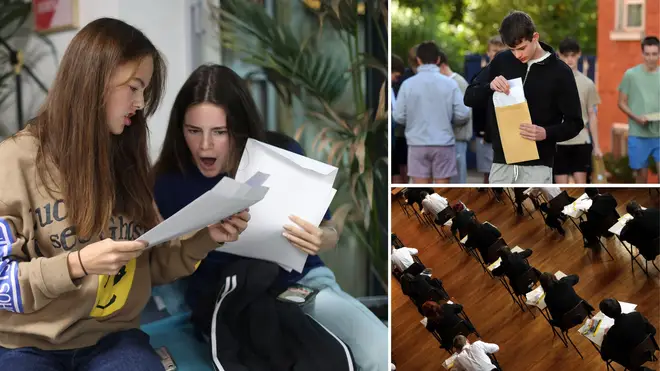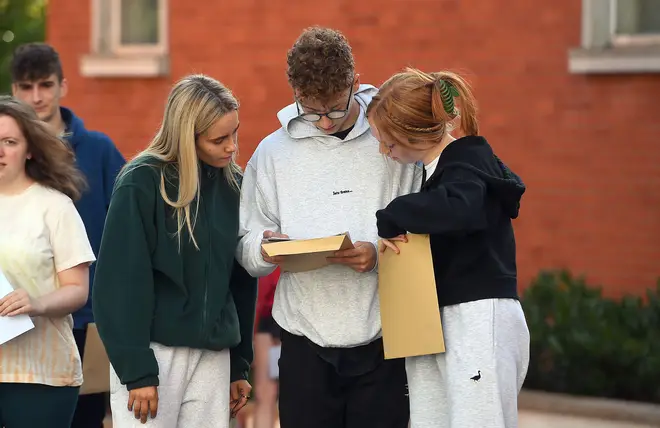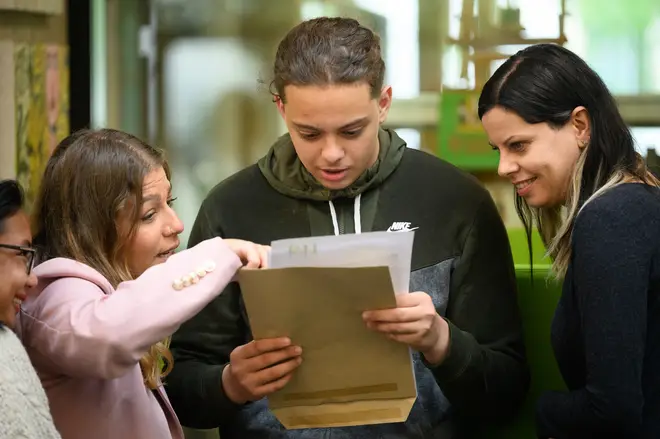
Tom Swarbrick 4pm - 6pm
24 August 2023, 08:02 | Updated: 24 August 2023, 08:09

GCSE students are expected to face a record increase of retakes when results are released today amid the return of tougher grading.
Pupils are said to face disappointment today as a record rise in GCSE retakes is set to hit students.
Some 75,000 students are predicted to find out they have failed their English and Maths as the number of grades below the pass threshold is anticipated to soar.
Professor Alan Smithers, the University of Buckingham's director of education estimated some 325,000 grade will fall below the marks required to pass.
The number of students achieving top marks - those with grades of 7 and above - is also expected to take a hit.
Under England’s 9-1 grading system, a 9 is the highest grade, with a 7 being broadly equivalent to an A, and a 4 to a C.
Northern Ireland and Wales still use the A*-G grading system.
Professor Smithers said the fall in top grades is part of an effort to bring an end to pandemic grade inflation, as pre-pandemic marking makes a return.
Those who receive a grade 3 or lower in Maths of English must retake the exam until they achieve at least a grade 4.

Professor Smithers said: “In order to continue at school or college they will have to be sat again.
“Most will fail again. They are caught up in a bad policy which confounds basic fluency in words and numbers with what is needed for high-level study. 'The government should urgently rethink its policy.”
But education academic professor Mary Richardson has suggested the return to pre-pandemic grading was too soon, as she argued the goals for the current academic year are “too harsh”.
More than 625,000 are set to receive their GCSE results this morning, and are apart of the same year group that has gone through school during Covid and teacher strikes this year.
Lee Elliot Major, professor of social mobility at Exeter University, said: “It’s a particularly tough time for this year’s GCSE students. They face harsher grade boundaries after experiencing so much disruption during the pandemic and now must brace themselves for a more intense competition for sixth-form and future university places due to the booming numbers of pupils in the population.
“All this is likely to mean greater divides between under-resourced pupils and their more privileged peers manifested in bigger national and regional inequalities.”
Education secretary Gillian Keegan said: “This cohort has shown tremendous resilience in recent years and should be proud of all the work they’ve done to reach this milestone. Grading is returning to normal, which means a pupil who would have achieved a grade 4 before the pandemic is just as likely to achieve that this year. Students now have more options to choose from than ever before.”

The percentage of Year 11 students who have missed at least 10 percent of lessons in the 2022/2023 academic year to May was around double the pre-pandemic rate, according to analysis by FFT Education Datalab.
GCSE grades for this year are expected to fall in line with those from 2019, which would mean around 300,000 fewer top grades.
During the pandemic in 2020 and 2021, teacher-assessed grades resulted in an increase in top grades.
It comes after A-level students were hit by a similar fall in top grades last week, in what was described as a “bruising” result for the year group.
The overall pass rate - A-levels receiving A* to E - fell to 97.3%, down slightly from 98.4% in 2022 and 97.6% in 2019. That is the lowest rate since 97.2% in 2008.
The fall in GCSE grades is expected to hit pupils in England disproportionately, as Wales and Northern Ireland exam regulators have said they will not return to pre-pandemic grading until next year.
A Department for Education spokesman said: “This year, GCSE grading is largely returning to normal in line with plans set out by Ofqual almost two years ago, to ensure qualifications maintain their value and students get the opportunities they deserve.
“For students collecting their results, those opportunities will be greater than ever before thanks to our brand new T-levels, alongside A-levels and other vocational and technical qualifications.
“We will also continue to support pupils through initiatives like the National Tutoring Programme, which is benefiting pupils most in need of support, including those in exam cohorts.”